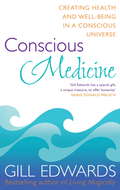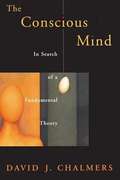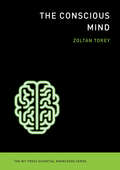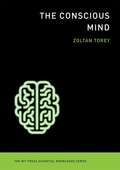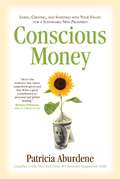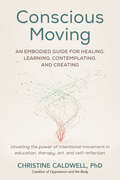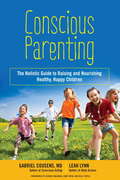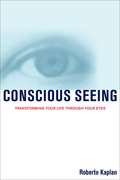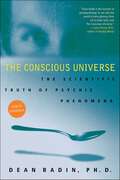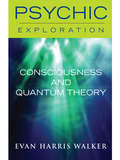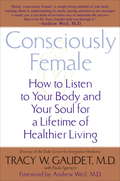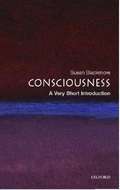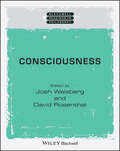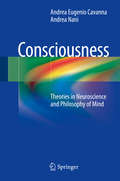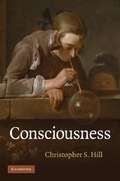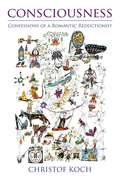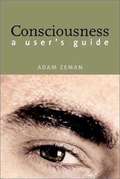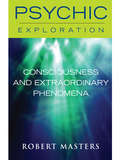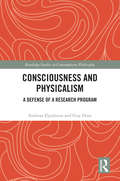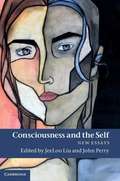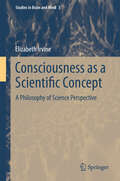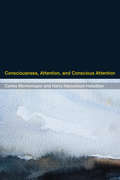- Table View
- List View
Conscious Medicine: A radical new approach to creating health and well-being
by Gill EdwardsRadical changes are afoot in medicine as we build stronger bridges between science and spirituality. In CONSCIOUS MEDICINE Gill Edwards explains that mind and body are inseparable and that emotions are crucial in health and disease. Her new approach to healthcare is based on the latest research into the transformative power of consciousness, energy and the bodymind. She explains how, when you break your old habits of thought, you can not only reverse disease processes and heal injuries but also attract more positive events and circumstances into your life. Chapters cover 'miracles' in health and why our current medical model is limiting, how negative thoughts activate the stress response in the body which eventually makes us ill, how the body speaks to us symbolically through symptoms and illness, how to break free from limiting patterns and create a new health-full future. Always thought-provoking and inspiring, this is an accessible, practical and joyous book.
Conscious Medicine: A radical new approach to creating health and well-being
by Gill EdwardsRadical changes are afoot in medicine as we build stronger bridges between science and spirituality. In CONSCIOUS MEDICINE Gill Edwards explains that mind and body are inseparable and that emotions are crucial in health and disease. Her new approach to healthcare is based on the latest research into the transformative power of consciousness, energy and the bodymind. She explains how, when you break your old habits of thought, you can not only reverse disease processes and heal injuries but also attract more positive events and circumstances into your life. Chapters cover 'miracles' in health and why our current medical model is limiting, how negative thoughts activate the stress response in the body which eventually makes us ill, how the body speaks to us symbolically through symptoms and illness, how to break free from limiting patterns and create a new health-full future. Always thought-provoking and inspiring, this is an accessible, practical and joyous book.
The Conscious Mind: In Search of a Fundamental Theory
by David J. ChalmersThe author provides a philosophical and technical insight into conciousness by trying to find answers to - how does the brain process environmental stimulation, integrate information and why is all this processing accompanied by an experienced inner life?
The Conscious Mind (The MIT Press Essential Knowledge series)
by Zoltan ToreyAn account of the emergence of the mind: how the brain acquired self-awareness, functional autonomy, the ability to think, and the power of speech.How did the human mind emerge from the collection of neurons that makes up the brain? How did the brain acquire self-awareness, functional autonomy, language, and the ability to think, to understand itself and the world? In this volume in the Essential Knowledge series, Zoltan Torey offers an accessible and concise description of the evolutionary breakthrough that created the human mind.Drawing on insights from evolutionary biology, neuroscience, and linguistics, Torey reconstructs the sequence of events by which Homo erectus became Homo sapiens. He describes the augmented functioning that underpins the emergent mind—a new (“off-line”) internal response system with which the brain accesses itself and then forms a selection mechanism for mentally generated behavior options. This functional breakthrough, Torey argues, explains how the animal brain's “awareness” became self-accessible and reflective—that is, how the human brain acquired a conscious mind. Consciousness, unlike animal awareness, is not a unitary phenomenon but a composite process. Torey's account shows how protolanguage evolved into language, how a brain subsystem for the emergent mind was built, and why these developments are opaque to introspection. We experience the brain's functional autonomy, he argues, as free will.Torey proposes that once life began, consciousness had to emerge—because consciousness is the informational source of the brain's behavioral response. Consciousness, he argues, is not a newly acquired “quality,” “cosmic principle,” “circuitry arrangement,” or “epiphenomenon,” as others have argued, but an indispensable working component of the living system's manner of functioning.
The Conscious Mind
by Zoltan ToreyHow did the human mind emerge from the collection of neurons that makes up the brain? How did the brain acquire self-awareness, functional autonomy, language, and the ability to think, to understand itself and the world? In this volume in the Essential Knowledge series, Zoltan Torey offers an accessible and concise description of the evolutionary breakthrough that created the human mind. Drawing on insights from evolutionary biology, neuroscience, and linguistics, Torey reconstructs the sequence of events by which Homo erectus became Homo sapiens. He describes the augmented functioning that underpins the emergent mind -- a new ("off-line") internal response system with which the brain accesses itself and then forms a selection mechanism for mentally generated behavior options. This functional breakthrough, Torey argues, explains how the animal brain's "awareness" became self-accessible and reflective -- that is, how the human brain acquired a conscious mind. Consciousness, unlike animal awareness, is not a unitary phenomenon but a composite process. Torey's account shows how protolanguage evolved into language, how a brain subsystem for the emergent mind was built, and why these developments are opaque to introspection. We experience the brain's functional autonomy, he argues, as free will. Torey proposes that once life began, consciousness had to emerge -- because consciousness is the informational source of the brain's behavioral response. Consciousness, he argues, is not a newly acquired "quality," "cosmic principle," "circuitry arrangement," or "epiphenomenon," as others have argued, but an indispensable working component of the living system's manner of functioning.
Conscious Money: Living, Creating, and Investing with Your Values for a Sustainable New Prosperity
by Patricia AburdeneWhy not make money and make a difference, too? A revolutionary blueprint for growing wealth, finding fulfillment, and changing the world by living your values. In the emerging era of Conscious Money, we achieve prosperity by tapping into the power of values, consciousness, and sound economic principles. By applying the wisdom of Conscious Money to your personal finances, you can build a foundation for sustainable wealth and true fulfillment. No longer will you need to choose between your core values and your paycheck. Instead you'll expand on-the-job creativity, grow income through conscious practices, and change the world as you: * identify your unique personal values; * break down barriers to financial success; * partner with companies that reflect your values; * express your values through conscious shopping; * tap into higher consciousness at the office; * harness your intuition to clarify financial choices; and * invest in enterprises that honor the planet.
Conscious Moving: An Embodied Guide for Healing, Learning, Contemplating, and Creating
by Christine CaldwellConscious Moving extends from one transformative belief: we feel more human, more empowered, and more ourselves when we live from that place within us—and all around us—that simply moves. And when we examine and trust in the emerging and evolving movement of our minds and bodies, we can better harness the tools needed to expand our creativity, wellbeing, and learning.Body-based psychotherapist, movement specialist, and renowned author-educator Christine Caldwell (Oppression and the Body) offers a radically ambitious mode of somatic awareness and inquiry—and shows how designing our own conscious movement practices can improve not only our own lives, but our relationships, communities, and culture.This anthology explores how movement practices can help us be more present; more grounded and intentional in responding to and working with experiences in the moment; and claim our own bodily autonomy. Caldwell and contributors explore these key benefits and applications in four critical areas:CreativityContemplationHealingLearningRooted in both ancient and modern scientific ways of knowing, Conscious Moving imparts fundamental principles and tools applicable to a broad spectrum of fields and professions. Topics explored in partnership with conscious movement practice include: Trauma and Oppression, Isolation and Loneliness, Addiction, Group Therapy, Sexuality, Creative Arts, and Grief.Encouraging each reader to pay attention to—and honor—their own embodied intuition, Conscious Moving is a non-prescriptive guide to accessing body-based wisdom for personal growth, community impact, and widespread social change.
Conscious Parenting
by Gabriel Cousens Leah LynnConscious Parenting is a great resource for parents seeking advice on optimal vegan nutrition and the importance of unplugging and having quiet time in nature for today's children. Anchored by extensive research on the importance of diet and environment by the world's leading authority on spiritual nutrition, the book is packed with advice and information to help you * choose authentic, organic, vegan food for optimal health;* support your child's emotional, social, and mental development; * counter the effects of environmental toxins and harmful media; * and create a nurturing environment for your child's spiritual growth. Table of Contents (Preview) Chapter 1: The Role of the Alive Parent / The Role of the Alive Child Chapter 2: Creating an Alive Environment / Six Foundations for Spiritual Life / The Sevenfold Peace Chapter 3: Perspectives on Support for the Alive Child According to Stages of Development Chapter 4: Supporting the Child's Physical Development / Living Foods for the Living Body / The Vegan, Live-Food Solution is Safe / A New Look at Transitioning from Eating Flesh Food / Don't Eat the Fish / Don't Pig Out / Poultry Problems Chapter 5: Why Authentic, Vegan, Organic Food? / Organic Foods / Organic Veganic Farming / Pesticide Pestilence / Protect Yourself Against Food Chemicalization / Genetically Engineered Foods / Irradiated Foods: Another Biohazard / Go Organic / The Low-Sugar Piece to the Whole Food Puzzle / Natural Low Sugar and No Sugar Sweeteners / Minerals and Children: Precious Gems / Children Need Dietary Fats / Protein for Growing Bodies/ Is a Plant-Sourced Diet Safe for Children? / But Children Don't Like Healthy Food? Soy What? And Other Vegan Foods to Be Wary Of Chapter 6: Holistic Veganism Chapter 7: Supporting the Child's Emotional Development / Living Foods and Freeing Up Emotions / Listening to How the Child Feels about Eating Animals / Thoughts, Emotions, and the Preparation of Food / Self-Esteem Chapter 8: Supporting the Child's Social Development / Living Foods and the Child's Social Development / Positive Socialization within the Home / Peaceful Conflict Resolution / Other Opportunities for Positive Socialization / Have You Ever Heard of the Candy Fairy? Chapter 9: Supporting the Child's Mental Development / Movement and the Mind / Childhood Depression / Nature and Learning / Emotional Safety and Learning / Deficient Diet and Mental Degeneration / Living Nutrition for the Living Brain / "Vitamin-O" (Oxygen) / Water / Food for Thought /The Mythological Dangers of High Cholesterol and High Fat / Health Dangers of Low Cholesterol / The Importance of Omega-3s for Health / Media Affects on the Child's Mind / The Harmful Effects of Pornography Chapter 10: Synergistic Toxicity of Brain and Body / The Great Vaccine Question for Parents Who Value Alive and Conscious Children: What To Do? / Gluten / Marijuana: Toxicity to the Brain / Fluoride: Toxicity to the Brain and Body / EMFs and Our Children's Brains / Perspectives on Dairy Chapter 11: Supporting the Child's Spiritual Development / Spiritual Nutrition for Childhood / Supporting the Spirit of the Child with Silence / Imagination / Meaningful Work /Wisdom Teachings / Music/ Chapter 12: Recipes for Children / Resources for Holistic Parenting
Conscious Seeing: Transforming Your Life Through Your Eyes
by Roberto KaplanConscious Seeing asks readers to look beyond the clinical diagnosis of their eye problems and see symptoms as valuable clues to their true nature. By developing an awareness that how they see is a reflection of their deepest selves, readers can gain the skills to modify their perceptions.
The Conscious Universe: The Scientific Truth of Psychic Phenomena
by Dean RadinRadin argues that the reality of psychic phenomena has been scientifically demonstrated, examines the reasons why this has not been accepted by the mainstream, and discusses the implications of psi.
The Conscious Universe: The Scientific Truth of Psychic Phenomena
by Dean RadinThe scientific evidence for telepathy, clairvoyance, prayer, jinxes, and other phenomena, from the author of Entangled Minds.This rigorously reasoned manifesto by an eminent parapsychologist provides astonishing answers to universal questions by unveiling persuasive empirical evidence for the existence of psychic phenomena. Dean Radin shatters myths that surround parapsychology, revealing the extent to which corporations, governments, and academia have embraced it, and exploring what the effects will be when—inevitably—mainstream science and society embrace it as well.Praise for The Conscious Universe“Radin is a mix of curiosity, scholarship, technical expertise, and sly wit.” —New York Times Magazine“Radin makes the most powerful case for the reality of parapsychological phenomena that I have yet encountered. . . . He writes clearly, powerfully, and persuasively, and this book shows that we are at a turning point in our scientific understanding of our minds and of nature.” —Rupert Sheldrake, PhD, author of The Sense of Being Stared At“Cutting perceptively through the spurious arguments frequently made by skeptics, [Radin] shows the evidence in favor of [paranormal] existence is overwhelming.” —Brian Johnson, PhD, Nobel laureate in physics
Consciousess and Quantum Theory
by Evan Harris WalkerThis essay, chapter 23 of Psychic Exploration, presents a theory of consciousness. Also presented is a paradigm that provides a bridge between science and religion. The full volume of Psychic Exploration can be purchased as an ebook or paperback version from all major online retailers and at cosimobooks.com.
Consciously Female
by Andrew Weil Tracy Gaudet Paula SpencerIn this revolutionary new book, Dr. Tracy Gaudet, director of the Duke Center for Integrative Medicine, shares her remarkable vision of a new way of looking at self and wellness, which will change the way women think about their bodies, their health, and their lives. Through her own personal journey as well as her work with thousands of women as an Ob-Gyn, Dr. Gaudet knows that being able to tap into the spiritual, emotional, and cyclical realities of female life has a powerful effect on health and well-being. Yet she has found that many women are "unconscious" of the intimate connections between these realms. Now Dr. Gaudet explains to women how to reconnect their bodies and their souls, in order to become "consciously female." Using her experience in integrative medicine, which draws on the best of both alternative and conventional Western practices, she offers mind-body techniques that will give you a deeper understanding of the inner workings of your body, and access to your unique feminine wisdom. By helping you make the best possible choices to support your health and wellness, the process of becoming "consciously female" will enrich and empower your life, day to day, week to week, year to year. From the Hardcover edition.
Consciousness: A Very Short Introduction
by Susan Blackmore"The last great mystery for science," consciousness has become a controversial topic. Consciousness: A Very Short Introduction challenges readers to reconsider key concepts such as personality, free will, and the soul. How can a physical brain create our experience of the world? What creates our identity? Do we really have free will? Could consciousness itself be an illusion? Exciting new developments in brain science are opening up these debates, and the field has now expanded to include biologists, neuroscientists, psychologists, and philosophers. This book clarifies the potentially confusing arguments and clearly describes the major theories, with illustrations and lively cartoons to help explain the experiments. Topics include vision and attention, theories of self, experiments on action and awareness, altered states of consciousness, and the effects of brain damage and drugs. This lively, engaging, and authoritative book provides a clear overview of the subject that combines the perspectives of philosophy, psychology, and neuroscience--and serves as a much-needed launch pad for further exploration of this complicated and unsolved issue.
Consciousness (Wiley Blackwell Readings in Philosophy)
by Steven M. CahnCONSCIOUSNESS Consciousness is a thought-provoking collection of classic and contemporary philosophical literature on consciousness, bringing together influential scholarship by seminal thinkers and the work of emerging voices who reflect the diversity of the field. Editors Josh Weisberg and David Rosenthal have selected discussions that animate modern debates and connect consciousness to broader philosophical topics. Providing an expansive view of the philosophical landscape of consciousness studies, this carefully calibrated reader features classic work from the past four decades by seminal thinkers such as Thomas Nagel, David Lewis, Ned Block, Gilbert Harman, and Daniel Dennett, as well as important recent work from David Chalmers, Fiona Macperson, Joseph Levine, Kathleen Akins, and other contemporary philosophers. Divided into five parts, Consciousness explores the nature of consciousness, consciousness and knowledge, qualitative consciousness, and theories of consciousness. A final section on agency and physicalism includes work by Galen Strawson and a previously unpublished article by Myrto Mylopoulos. Philosophically challenging yet accessible to students, Consciousness is an ideal reader for many undergraduate and graduate courses on consciousness or philosophy of mind, as well as a useful supplementary text for general classes in philosophy and a valuable reference text for philosophers of mind, cognitive scientists, and psychologists.
Consciousness: Theories in Neuroscience and Philosophy of Mind
by Andrea Eugenio Cavanna Andrea NaniThis book reviews some of the most important scientific and philosophical theories concerning the nature of mind and consciousness. Current theories on the mind-body problem and the neural correlates of consciousness are presented through a series of biographical sketches of the most influential thinkers across the fields of philosophy of mind, psychology and neuroscience. The book is divided into two parts: the first is dedicated to philosophers of mind and the second, to neuroscientists/experimental psychologists. Each part comprises twenty short chapters, with each chapter being dedicated to one author. A brief introduction is given on his or her life and most important works and influences. The most influential theory/ies developed by each author are then carefully explained and examined with the aim of scrutinizing the strengths and weaknesses of the different approaches to the nature of consciousness.
Consciousness
by Christopher S. HillThis book presents a novel and comprehensive theory of consciousness. The initial chapter distinguishes six main forms of consciousness and sketches an account of each one. Later chapters focus on phenomenal consciousness, consciousness of, and introspective consciousness. In discussing phenomenal consciousness, Hill develops the representational theory of mind in new directions, arguing that all awareness involves representations, even awareness of qualitative states like pain. He then uses this view to undercut dualistic accounts of qualitative states. Other topics include visual awareness, visual appearances, emotional qualia, and meta-cognitive processing. This important work will interest a wide readership of students and scholars in philosophy of mind and cognitive science.
Consciousness
by Christof KochWhat links conscious experience of pain, joy, color, and smell to bioelectrical activity in the brain? How can anything physical give rise to nonphysical, subjective, conscious states? Christof Koch has devoted much of his career to bridging the seemingly unbridgeable gap between the physics of the brain and phenomenal experience. This engaging book--part scientific overview, part memoir, part futurist speculation--describes Koch's search for an empirical explanation for consciousness. Koch recounts not only the birth of the modern science of consciousness but also the subterranean motivation for his quest--his instinctual (if "romantic") belief that life is meaningful. Koch describes his own groundbreaking work with Francis Crick in the 1990s and 2000s and the gradual emergence of consciousness (once considered a "fringy" subject) as a legitimate topic for scientific investigation. Present at this paradigm shift were Koch and a handful of colleagues, including Ned Block, David Chalmers, Stanislas Dehaene, Giulio Tononi, Wolf Singer, and others. Aiding and abetting it were new techniques to listen in on the activity of individual nerve cells, clinical studies, and brain-imaging technologies that allowed safe and noninvasive study of the human brain in action. Koch gives us stories from the front lines of modern research into the neurobiology of consciousness as well as his own reflections on a variety of topics, including the distinction between attention and awareness, the unconscious, how neurons respond to Homer Simpson, the physics and biology of free will, dogs, Der Ring des Nibelungen, sentient machines, the loss of his belief in a personal God, and sadness. All of them are signposts in the pursuit of his life's work--to uncover the roots of consciousness.
Consciousness: A User's Guide
by Adam ZemanThis engaging and readable book provides an introduction to consciousness that does justice both to the science and to the philosophy of consciousness, that is, the mechanics of the mind and the experience of awareness. The book opens with a general discussion of the brain and of consciousness itself. Then, exploring the areas of brain science most likely to illuminate the basis of awareness, Zeman focuses on the science of sleep and waking and on the science of vision. He describes healthy states and disorders--epilepsy, narcolepsy, blindsight and hallucinations after stroke--that provide insights into the capacity for consciousness and into its contents. And he tracks the evolution of the brain, the human species, and human culture and surveys the main current scientific theories of awareness, pioneering attempts to explain how the brain gives rise to experience. Zeman concludes by examining philosophical arguments about the nature of consciousness. A practicing neurologist, he animates his text with examples from the behavioral and neurological disorders of his patients and from the expanding mental worlds of young children, including his own. His book is an accessible and enlightening explanation of why we are conscious.
Consciousness and Extraordinary Phenomena
by Robert MastersTwo cases are described in which extraordinary phenomena appear to have been elicited within the context of altered states of consciousness (trance) in a laboratory setting. This essay, chapter 26 of Psychic Exploration, studies these two cases. The full volume of Psychic Exploration can be purchased as an ebook or paperback version from all major online retailers and at cosimobooks.com.
Consciousness and Perceptual Experience
by Thomas NatsoulasThis book describes and proposes an unusual integrative approach to human perception that qualifies as both an ecological and a phenomenological approach at the same time. Thomas Natsoulas shows us how our consciousness - in three of six senses of the word that the book identifies - is involved in our activity of perceiving the one and only world that exists, which includes oneself as a proper part of it, and that all of us share together with the rest of life on earth. He makes the case that our stream of consciousness - in the original Jamesian sense minus his mental/physical dualism - provides us with firsthand contact with the world, as opposed to our having such contact instead with theorist-posited items such as inner mental representations, internal pictures, or sense-image models, pure figments and virtual objects, none of which can have effects on our sensory receptors.
Consciousness and Physicalism: A Defense of a Research Program (Routledge Studies in Contemporary Philosophy)
by Andreas Elpidorou Guy DoveConsciousness and Physicalism: A Defense of a Research Program explores the nature of consciousness and its place in the world, offering a revisionist account of what it means to say that consciousness is nothing over and above the physical. By synthesizing work in the philosophy of mind, metaphysics, and philosophy of science from the last twenty years and forging a dialogue with contemporary research in the empirical sciences of the mind, Andreas Elpidorou and Guy Dove advance and defend a novel formulation of physicalism. Although physicalism has been traditionally understood to be a metaphysical thesis, Elpidorou and Dove argue that there is an alternative and indeed preferable understanding of physicalism that both renders physicalism a scientifically informed explanatory project and allows us to make important progress in addressing the ontological problem of consciousness. Physicalism, Elpidorou and Dove hold, is best viewed not as a thesis (metaphysical or otherwise) but as an interdisciplinary research program that aims to compositionally explain all natural phenomena that are central to our understanding of our place in nature. Consciousness and Physicalism is replete with philosophical arguments and informed, through and through, by findings in many areas of scientific research. It advances the debate regarding the ontological status of consciousness. It will interest students and scholars in philosophy of mind, metaphysics, philosophy of cognitive science, and philosophy of science. And it will challenge both foes and friends of physicalism.
Consciousness and the Self
by John Perry Jeeloo Liu'I never can catch myself at any time without a perception, and never can observe any thing but the perception.' These famous words of David Hume, on his inability to perceive the self, set the stage for JeeLoo Liu and John Perry's collection of essays on self-awareness and self-knowledge. This volume connects recent scientific studies on consciousness with the traditional issues about the self explored by Descartes, Locke and Hume. Experts in the field offer contrasting perspectives on matters such as the relation between consciousness and self-awareness, the notion of personhood and the epistemic access to one's own thoughts, desires or attitudes. The volume will be of interest to philosophers, psychologists, neuroscientists, cognitive scientists and others working on the central topics of consciousness and the self.
Consciousness as a Scientific Concept: A Philosophy of Science Perspective (Studies in Brain and Mind #5)
by Elizabeth IrvineThe source of endless speculation and public curiosity, our scientific quest for the origins of human consciousness has expanded along with the technical capabilities of science itself and remains one of the key topics able to fire public as much as academic interest. Yet many problematic issues, identified in this important new book, remain unresolved. Focusing on a series of methodological difficulties swirling around consciousness research, the contributors to this volume suggest that 'consciousness' is, in fact, not a wholly viable scientific concept. Supporting this 'eliminativist' stance are assessments of the current theories and methods of consciousness science in their own terms, as well as applications of good scientific practice criteria from the philosophy of science. For example, the work identifies the central problem of the misuse of qualitative difference and dissociation paradigms, often deployed to identify measures of consciousness. It also examines the difficulties that attend the wide range of experimental protocols used to operationalise consciousness--and the implications this has on the findings of integrative approaches across behavioural and neurophysiological research. The work also explores the significant mismatch between the common intuitions about the content of consciousness, that motivate much of the current science, and the actual properties of the neural processes underlying sensory and cognitive phenomena. Even as it makes the negative eliminativist case, the strong empirical grounding in this volume also allows positive characterisations to be made about the products of the current science of consciousness, facilitating a re-identification of target phenomena and valid research questions for the mind sciences.
Consciousness, Attention, and Conscious Attention (The\mit Press Ser.)
by Carlos Montemayor Harry Haroutioun HaladjianA rigorous analysis of current empirical and theoretical work supporting the argument that consciousness and attention are largely dissociated.In this book, Carlos Montemayor and Harry Haladjian consider the relationship between consciousness and attention. The cognitive mechanism of attention has often been compared to consciousness, because attention and consciousness appear to share similar qualities. But, Montemayor and Haladjian point out, attention is defined functionally, whereas consciousness is generally defined in terms of its phenomenal character without a clear functional purpose. They offer new insights and proposals about how best to understand and study the relationship between consciousness and attention by examining their functional aspects. The book's ultimate conclusion is that consciousness and attention are largely dissociated. Undertaking a rigorous analysis of current empirical and theoretical work on attention and consciousness, Montemayor and Haladjian propose a spectrum of dissociation—a framework that identifies the levels of dissociation between consciousness and attention—ranging from identity to full dissociation. They argue that conscious attention, the focusing of attention on the contents of awareness, is constituted by overlapping but distinct processes of consciousness and attention. Conscious attention, they claim, evolved after the basic forms of attention, increasing access to the richest kinds of cognitive contents.Montemayor and Haladjian's goal is to help unify the study of consciousness and attention across the disciplines. A focused examination of conscious attention will, they believe, enable theoretical progress that will further our understanding of the human mind.
